Education Projects for Refugees in Kakuma, Kenya
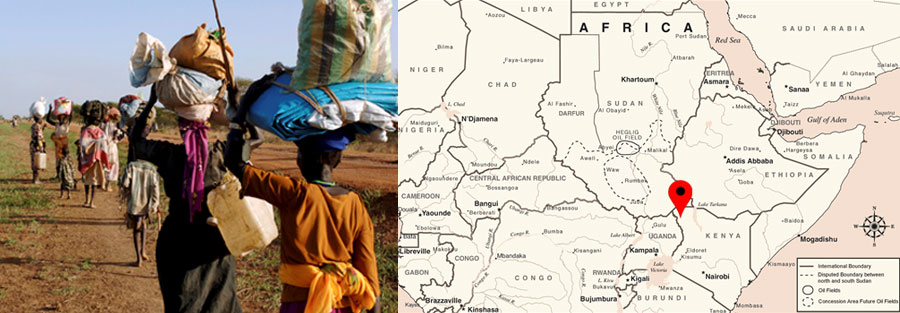
Horseed Kakuma Primary School, Site Visit and Background
Summary
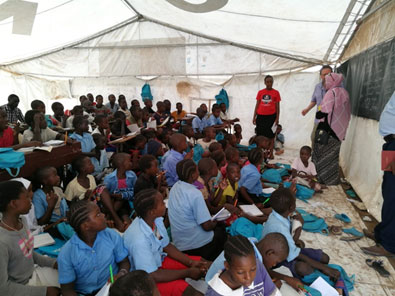
In March 2020, Ron Quejas-Risdon (Director for East Africa, The Unforgotten Fund, USA) and Najat Abdi Muhammad (Kenya Country Director, Global One, UK) returned from Kakuma, Kenya scoping out a school construction project in the UN Refugee Camp in Kakuma. Located in northwest Kenya, Kakuma is a large refugee camp under UNHCR’s mandate providing refuge for 200,000 people from South Sudan, Somalia, Ethiopia, Uganda and DRC/Congo. Ron and Najat met with UNHCR, Global One, Lutheran World Federation, parents, school administrators, and community leaders. Horseed Primary school is in need of new classrooms, computer and library facilities. We are looking forward to working with our partners to complete this project by September 2020. We welcome the participation of UNA chapter representatives!!
Background
Under the Adopt-a-Future initiative of the United Nations Association, the Greater Lansing UNA chapter (GLUNA) undertook the sponsorship of Horseed Primary School, located in the Kakuma refugee center in Kenya.
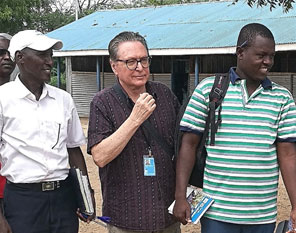
In March 2019, Ronald Quejas-Risdon, a retired U.N. Peacekeeper and member of GLUNA, along with Phillipa Blake-Roberts, a UK based author visited Kakuma to convey a letter of greetings from GLUNA and to conduct background research for a proposed book on the life of U.N. staff. During that visit they met with Headteacher, Nick Lokitela and in the course of discussions he identified several projects badly needed by the school.
In June 2019 Quejas-Risdon was appointed as Director for East Africa for The Unforgotten Fund. He proposed as a first project to revisit that list of projects identified by the Headteacher for Horseed Primary School. A site visit in March 2020 looked into the feasibility of such an undertaking.
Kakuma and Horseed School
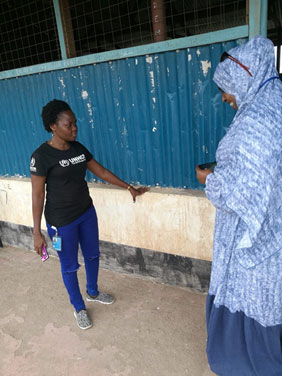
Kakuma schools fall under the mandate of UNHCR, and they manage primary education jointly with the World Lutheran Federation. Current total enrolment in the Kakuma system is 44,099 students.
Located in zone two of Kakuma, the Horseed Primary School in 2020 has an enrolment of 2453 students (1149 girls and 1304 boys). They are registered in class, or grades’ one through eight. Forty-five percent of the students are female and 55% are male. National backgrounds of the students in Horseed Primary, in descending order include Somalia, South Sudan, Sudan, Congo, Burundi and Ethiopia.
Of special note, eleven host community students are now enrolled in Horseed school as well. The attendance of host community students is a relatively new but increasing trend throughout the Kakuma system and we visited several schools that have a mixed refugee and host community student population. Taking this into consideration we may want to plan projects that specifically benefit members of both the refugee community and the host community.
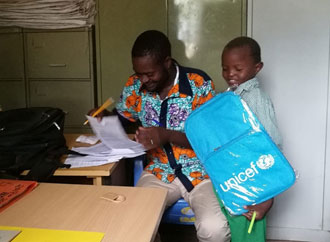
The faculty of Horseed consists of 27 teachers with the following breakdown: 20 are male, 7 are female. Of that total 4 are certified teachers in the Kenyan Education System (3 male, 1 female) and the remaining 23 are incentive teachers. Incentive teachers are members of the Kakuma refugee community, often with relevant past experience in their nation of origin, and who are given special training to certify them to teach in the refugee schools. The Headteacher, Mr. Nick Lokitela is one of the teachers assigned from the Kenyan Education System.
In summary, a project in Horseed Primary School to provide improved facilities would directly benefit 2453 students on a continuous and daily basis. Also receiving important benefits would be the 27 members of the faculty as well as the local community and families of the eleven host community students currently attending Horseed Primary.
Site Visit
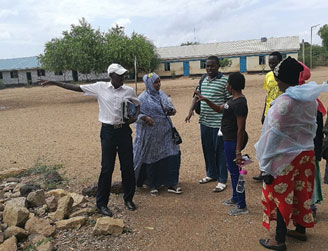
A site visit was conducted March 10-13, 2020. We wish to thank UNHCR for their assistance in organizing the program, arranging the various tours and visits and graciously providing transportation during our visit.
The purpose of the visit was to consult with the UNHCR Director of Educational Programs and his Assistant, representatives of the Lutheran World Federation who manage the schools in Kakuma, representatives of the Kenya Education Department, Headteacher and representatives of the faculty of Horseed School as well as members of the Board of Management representing the community.
Prior to the above-mentioned joint meeting we consulted with Headteacher Lokitela to confirm the continued viability of the list of projects he had previously shared with us and to get a tour of the school grounds and facilities. Afterwards, during a general meeting with all concerned parties, there was a lively discussion during which all parties shared their concerns as well as their desires to advance educational opportunities for the children in Kakuma. It was agreed that the following projects would be undertaken as soon as feasible.
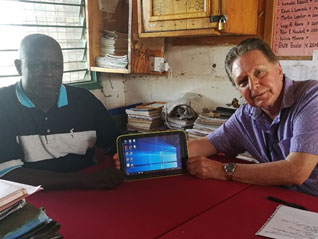
- UNHCR Engineering Office will review the site and determine necessary repairs and work to be done to the perimeter fence to provide adequate security of the school and all facilities.
- Two new classrooms, of either semi-permanent or permanent construction to be determined based on cost, are to be constructed. Permanent construction is a solid block or brick wall. Semi-permanent is a solid wall of one meter completed with corrugated metal sheet construction.
- The classrooms will be separated by a portable/movable solid wall which when opened will provide a large general purpose and/or community meeting room.
- At one end of the classrooms an additional room for book storage and one for IT storage will be incorporated. The construction will be of full permanent walls with secure locking doors and secure windows. The IT room will provide multiple outlets for charging tablets and computers.
All construction will be in compliance with Kenyan Educational requirements as regards size, construction and all other requirements.
The UNHCR Engineering Office has agreed to do a preliminary draft for the construction design to comply with all requirements and submit it to Unforgotten Fund and Global One for their review.
The agreed upon construction documents will be put out for bids by Global One in accordance with their bid process. Unforgotten Fund, in conjunction with Global One will review and award the bid and construction will begin as soon as practicable thereafter. The Unforgotten Fund will provide the funding and overall administration of the project with Global One taking the lead on implementation and oversight of the construction. It will be a joint project.
Proposed timelines
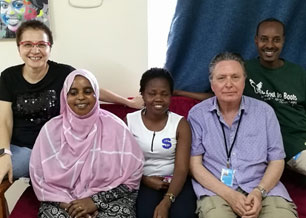
- Solicit bids by September 2020
- Award bids by November-December 2020
- Begin construction as soon thereafter as possible
- Project to be completed by end of 2021
- Dedication ceremony in November-December 2021
Conclusion and recommendations
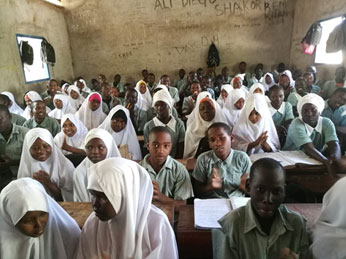
Future projects should either benefit both the refugee and host community or we should strike a balance between projects to achieve that end.
We should look first at schools that serve both refugee and host community learners.
Very serious consideration should be given to providing day-care or boarding assistance to the young and vulnerable children begging and working in and around the Kakuma Refugee Camp.
We should look into a program to provide “a desk and a tablet” for each student, or an adequate number for each school to provide for the students using the tablets.
Lastly, it will be of great help if we also consider training more teachers to reduce overcrowding in classrooms.
Addendum: Other school visits
In the course of conducting the site visit to Horseed Primary School, the team visited several other schools and governmental offices. Please visit this page for more information about these visits.
